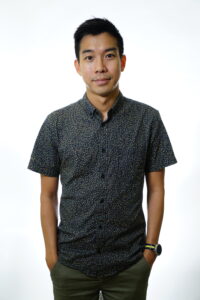The MLRC School Network Glocal Scholar series is part of our commitment to integrate local and global contexts and to explore a range of issues related to the education of multilingual learners. As defined in our recent publication, “Glocal Network Shifts: Exploring Language Policies and Practices in International Schools“, the term glocal reflects our goal to problematize the boundaries that often exist be tween conceptions of “global” and “local”, including the separation sometimes observed between international schools and their local context.
tween conceptions of “global” and “local”, including the separation sometimes observed between international schools and their local context.
Luke Lu, Assistant Professor of Linguistics and Multilingual Studies, at Nanyang Technological University, Singapore, is our second Glocal Scholar of the 2023-2024 academic year. Before becoming a researcher, Luke taught General Paper in a local Junior College for five years. He is primarily interested in approaches to interactional sociolinguistics and ethnography, pertaining to issues such as transnational mobility, education, language rights, language planning and policy, and ethnicity.
Luke will present about his work at the MLRC Research Symposium on December 2-3, 2023 at XCL World Academy. The MLRC Research Symposium is a unique two-day opportunity for international educators – teachers and leaders – to engage deeply in existing research about multilingual learners, connect with global education scholars, inquire together about shared problems of practice and discuss innovative strategies for serving multilingual learners.
Luke’s scholarship is based in the linguistically and culturally diverse context of Singapore, which includes four official languages: Malay, Mandarin, Tamil and English. In his work, Luke explores the use of Singlish, a commonly used, though criticized vernacular of English, often viewed as a hindrance to learning standard forms. Luke’s precent project involved examining the pedagogical value of Singlish in ELT classrooms. Luke shared with the MLRC:
A voluminous amount of research has been devoted to develop and assess strategies that include the use of vernaculars as resources when teaching standard forms of language. This has occurred in both non-English speaking contexts, as well as much of the Anglophone world. Such an approach is broadly known as additive bidialectalism, where the aim is to teach the standard language without eliminating non-standard varieties of the language from the classroom. Importantly, the use of non-standard varieties are not treated as a deficit, nor ascribed negative values and attitudes, so as to prevent the perpetuation of condescension toward speakers who have difficulty switching between non-standard and standard forms of the language.
The consensus of research thus far suggests that there are measurable beneficial learning outcomes by adopting bidialectal methods of instruction. My study parallels these bidialectal strategies around the world, by developing a pioneering bidialectal programme for local secondary school learners involving Singlish (the local vernacular) and Standard English. Students were found to be able to negotiate and contest the appropriateness of Singlish in specific situations, while deploying Singlish and Standard English features appropriately in written tasks (i.e., designing advertisements for various products). This suggests that Singlish can be a useful pedagogical resource in the development of critical language awareness, and that prevalent discourses surrounding the use of Singlish and Standard English by Singaporean students severely underestimate the proficiencies that they possess. Nonetheless, there are specific challenges for the teacher in implementing such strategies in the classroom, including having to grapple with conflicting views of Singlish held by students, some of whom continue to see Singlish as ‘bad English’ associated with the lower classes.
We are very excited to welcome Luke to the MLRC Research Symposium. To connect with Luke and learn more about his research in person, please consider joining the MLRC Research Symposium on December 2-3, 2023 in Singapore. In addition, interested MLRC School Network members can reach out to Luke at lujiqun@ntu.edu.sg or visit his university website: https://dr.ntu.edu.sg/cris/rp/rp01158
